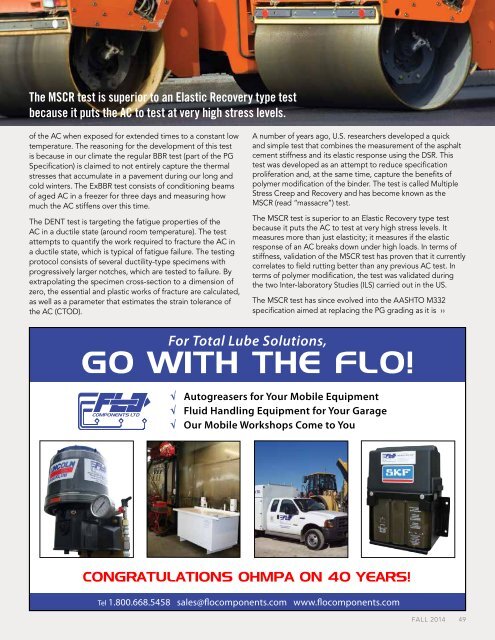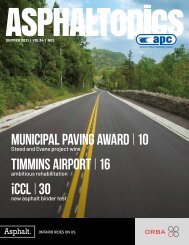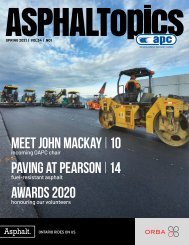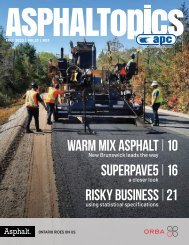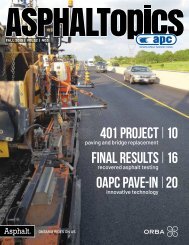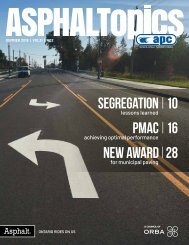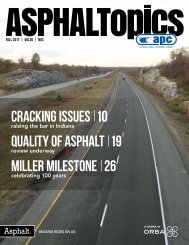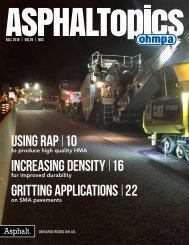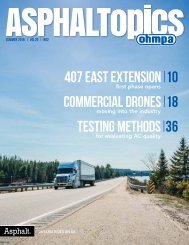ASPHALTopics | Summer 2014 | VOL 27 | NO3
Create successful ePaper yourself
Turn your PDF publications into a flip-book with our unique Google optimized e-Paper software.
The MSCR test is superior to an Elastic Recovery type test<br />
because it puts the AC to test at very high stress levels.<br />
of the AC when exposed for extended times to a constant low<br />
temperature. The reasoning for the development of this test<br />
is because in our climate the regular BBR test (part of the PG<br />
Specification) is claimed to not entirely capture the thermal<br />
stresses that accumulate in a pavement during our long and<br />
cold winters. The ExBBR test consists of conditioning beams<br />
of aged AC in a freezer for three days and measuring how<br />
much the AC stiffens over this time.<br />
The DENT test is targeting the fatigue properties of the<br />
AC in a ductile state (around room temperature). The test<br />
attempts to quantify the work required to fracture the AC in<br />
a ductile state, which is typical of fatigue failure. The testing<br />
protocol consists of several ductility-type specimens with<br />
progressively larger notches, which are tested to failure. By<br />
extrapolating the specimen cross-section to a dimension of<br />
zero, the essential and plastic works of fracture are calculated,<br />
as well as a parameter that estimates the strain tolerance of<br />
the AC (CTOD).<br />
A number of years ago, U.S. researchers developed a quick<br />
and simple test that combines the measurement of the asphalt<br />
cement stiffness and its elastic response using the DSR. This<br />
test was developed as an attempt to reduce specification<br />
proliferation and, at the same time, capture the benefits of<br />
polymer modification of the binder. The test is called Multiple<br />
Stress Creep and Recovery and has become known as the<br />
MSCR (read “massacre”) test.<br />
The MSCR test is superior to an Elastic Recovery type test<br />
because it puts the AC to test at very high stress levels. It<br />
measures more than just elasticity; it measures if the elastic<br />
response of an AC breaks down under high loads. In terms of<br />
stiffness, validation of the MSCR test has proven that it currently<br />
correlates to field rutting better than any previous AC test. In<br />
terms of polymer modification, the test was validated during<br />
the two Inter-laboratory Studies (ILS) carried out in the US.<br />
The MSCR test has since evolved into the AASHTO M332<br />
specification aimed at replacing the PG grading as it is ››<br />
For Total Lube Solutions,<br />
GO WITH THE FLO!<br />
√ Autogreasers for Your Mobile Equipment<br />
√ Fluid Handling Equipment for Your Garage<br />
√ Our Mobile Workshops Come to You<br />
CONGRATULATIONS OHMPA ON 40 YEARS!<br />
Tel 1.800.668.5458 sales@flocomponents.com www.flocomponents.com<br />
FALL <strong>2014</strong> 49


